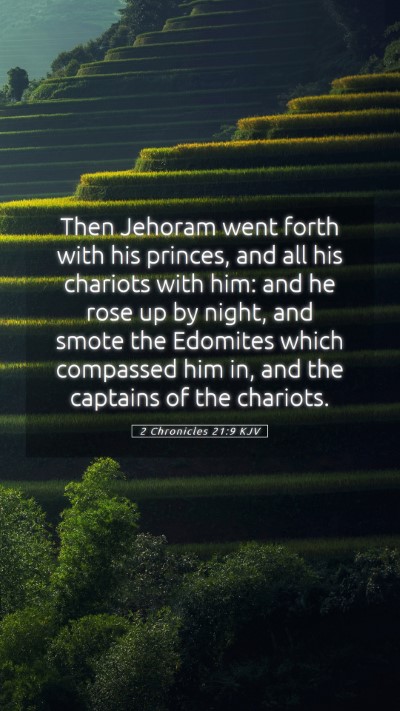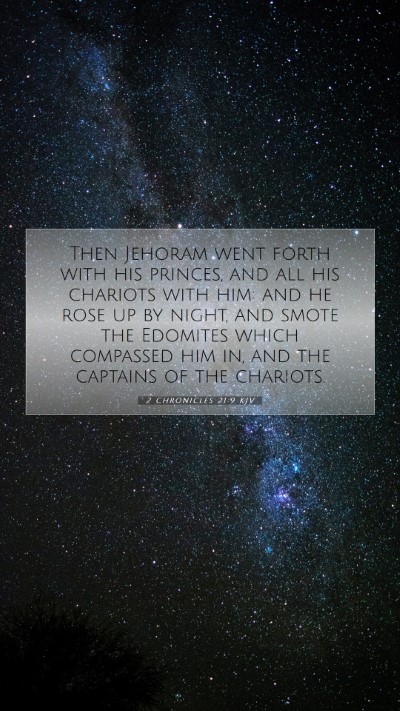Understanding 2 Chronicles 21:9
Bible Verse: 2 Chronicles 21:9 - "Then Jehoram went out to the land of Edom, and all the captains of the chariots with him; and he rose by night, and smote the Edomites which compassed him about: and the captains of the chariots."
Summary and Context
This passage reflects a critical moment in the reign of King Jehoram of Judah. Jehoram took significant military action against the Edomites, showcasing his authority and strength as a ruler. To fully grasp the implications of this verse, we must consider the historical context of Jehoram's reign, the relationship between Judah and Edom, and the broader scriptural narrative.
Interpretation and Commentary
This section combines insights from various public domain commentaries to explore the meaning of this verse.
Matthew Henry's Commentary
According to Matthew Henry, Jehoram’s actions were not just political or military; they were also a reflection of his character and leadership style. Henry emphasizes that Jehoram’s decision to confront the Edomites by night was both strategic and desperate, indicating his desire to establish dominance in a challenging situation. Moreover, Henry notes that such military maneuvers often stemmed from a lack of faith in God’s deliverance, highlighting a troubled relationship between Jehoram and the divine.
Albert Barnes' Commentary
Albert Barnes provides a detailed analysis of the significance of Edom as a neighboring kingdom, emphasizing the historical tension between Judah and Edom. Barnes points out that Jehoram’s attack demonstrates his ambition to solidify power and may have been an attempt to avenge past grievances. He discusses how the military actions taken reflect the volatility of power during Jehoram’s reign and warns of the consequences of such aggression, particularly when guided by self-interest rather than righteousness.
Adam Clarke's Commentary
Adam Clarke adds depth by considering the spiritual implications of Jehoram's choices. He highlights that Jehoram, having turned away from the worship of Yahweh, relied on his military strength instead. Clarke warns that such reliance on earthly power often leads to spiritual downfall, a theme consistent with the narratives surrounding the kingdoms of Israel and Judah. His invasion of Edom showcases the futility of human efforts when disconnected from divine guidance.
Key Themes and Lessons
- Military Strength vs. Divine Guidance: This passage illustrates the tension between relying on human strength and seeking divine help. It encourages readers to reflect on where their true reliance lies.
- The Consequences of Leadership Decisions: Jehoram’s confrontational approach emphasizes how choices made by leaders have far-reaching consequences, not just politically but spiritually and socially.
- The Importance of Faith: By contextualizing Jehoram’s actions within his spiritual failings, the passage serves as a cautionary tale about the importance of faith and commitment to God in decision-making.
- Historical Significance: Understanding the historical context between Judah and Edom aids in interpreting the motivations behind Jehoram’s actions and the larger narrative of Israel’s history.
Cross References
Several verses and passages can be referenced in relation to 2 Chronicles 21:9:
- 2 Kings 8:20-22: Discusses the revolt of Edom against Judah.
- Isaiah 34:5-6: Prophetic judgment against Edom, illustrating broader themes of judgment.
- 2 Chronicles 20:1-30: God’s deliverance in the face of enemy armies, contrasting Jehoram’s reliance on military power.
Conclusion
In summary, 2 Chronicles 21:9 serves as a profound example of the intersection between political action and spiritual consequences. Through the insights gained from commentaries and historical context, we can enrich our Bible verse understanding and apply these lessons to our lives. This verse reminds us of the necessity of divine guidance in leadership and personal decision-making.
For those engaged in Bible study groups or looking for Bible study resources, considering the implications of this text can lead to meaningful discussions about the nature of authority, faith, and reliance on God.


